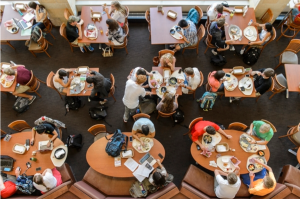Stricter requirements leave students hungry
by Mackenzie Krumme
A survey conducted in 2015 by University of Wisconsin-Madison HOPE lab indicates 20 percent of community college students surveyed have gone hungry because they didn’t have money for food. The study called attention to the fact that a significant number of college and university students struggle with meeting their most basic needs.
At the University of Wisconsin-Madison, a program called FoodShare can help fund food costs for students in need.
Maggie Denman, 26, a UW-Madison transfer student, participated in Wisconsin’s FoodShare program for two years, receiving roughly $120 per month to pay for food.
“I was able to work less and focus on school. I was working three jobs, I worked every day of the week,” said Denman.
This relief didn’t last long, as new program requirements released this fall pushed Denman out. Under the new rules, students are only eligible for FoodShare benefits if they meet at least one of 13 criteria. Examples include working 20 hours per week at minimum wage or higher, being a single parent or having a disability which makes you unfit for employment.
If Denman worked the required 20 hours per week, her monthly income would be too high to qualify for the program. Frustrated, she stopped applying for FoodShare support.
“You are surrounded by students (at the University) who don’t have to work and can focus solely on academics or internships,” said Denman. “They have time to do internships and I had to work every weekend and I never had a day off. School, study, sleep, school, study and sleep.”
FoodShare, also called Supplemental Nutrition Assistance Program outside of Wisconsin, is a program dedicated to helping low-income families pay for food. The HOPE lab study about FoodShare use comes at a time when a Republican-led committee aimed at reforming Wisconsin public benefits program is focusing on Wisconsin FoodShare.
Over the past year the Committee of Public Benefit Reform constructed two major bills that have passed the Assembly.
The first bill requires FoodShare recipients to show a photo identification card when purchasing food through the program. If this bill passes the Senate, Wisconsin will be one of several states, including Maine and Massachusetts, that requires photo identification for the SNAP program.
The second bill would require FoodShare recipients to take a drug test before receiving benefits.
 The Arc: Visions of justice
The Arc: Visions of justice
